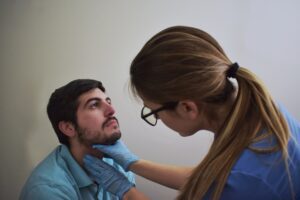

Call Us Today
(828) 505-7033
Email Us
info@advancedoccmed.com
Visit Us
1550 Hendersonville Rd Suite 200 Asheville, NC 28803

(828) 505-7033
info@advancedoccmed.com
1550 Hendersonville Rd Suite 200 Asheville, NC 28803

As the world becomes more interconnected, international travel has become a common part of our lives. While traveling to new destinations offers exciting experiences, it also exposes us to potential health risks, such as infectious diseases. Malaria, a mosquito-borne illness, is one such disease that can pose a serious threat to travelers visiting certain regions. At Advanced OccMed, we understand the significance of proactive health measures for travelers. In this comprehensive blog post, we will delve into the importance of getting a malaria vaccine before international travel, highlighting the significance of preventive measures to ensure a safe and memorable journey.
Malaria is a potentially life-threatening disease caused by Plasmodium parasites transmitted through the bites of infected female Anopheles mosquitoes. The parasites multiply in the liver and then infect red blood cells, leading to a range of symptoms such as fever, chills, headache, and muscle aches. In severe cases, malaria can result in organ failure and even death.
Malaria is prevalent in tropical and subtropical regions, including parts of Africa, Asia, Latin America, and the Middle East. Travelers visiting these regions are at risk of contracting malaria, especially if they do not take proper preventive measures.
Vaccination While there is no commercially available malaria vaccine that offers complete protection against the disease, significant progress has been made in developing preventive vaccines. One of the leading malaria vaccines is Mosquirix (RTS,S), which has been approved for use in some African countries as part of pilot implementation programs.
It is essential to understand that current malaria vaccines do not provide complete immunity. However, they can offer substantial protection against severe malaria and reduce the risk of life-threatening complications. Therefore, getting vaccinated is a critical step for travelers planning to visit malaria-endemic regions.
Vaccination is only one component of comprehensive malaria prevention. Travelers should adopt a multi-faceted approach to reduce the risk of contracting malaria:
Use Insect Repellents: Apply insect repellents containing DEET, picaridin, or oil of lemon eucalyptus to exposed skin and clothing to repel mosquitoes effectively.
Wear Protective Clothing: Covering the skin with long-sleeved shirts, long pants, and socks during peak mosquito activity times can reduce the risk of mosquito bites.
Sleep Under Mosquito Nets: Using bed nets treated with insecticides while sleeping creates a protective barrier against mosquitoes, especially during nighttime when mosquitoes are most active.
Take Antimalarial Medications: Consider taking antimalarial medications as prescribed by healthcare professionals. The choice of medication may depend on the destination’s specific malaria risks and the traveler’s health status.
Travel clinics, such as Advanced OccMed, play a vital role in providing personalized advice and guidance to travelers. By visiting a travel clinic before departure, travelers can receive comprehensive pre-travel consultations, which may include:
Individualized Risk Assessment: Healthcare professionals assess each traveler’s health status, medical history, and specific travel plans to determine their malaria risk.
Vaccine Recommendations: Based on the risk assessment, healthcare providers recommend appropriate vaccines, including the malaria vaccine if applicable.
Health Education: Travel clinics educate travelers about malaria prevention strategies and general travel health guidelines to ensure their safety during the trip.
Even for last-minute travelers, seeking vaccination and preventive advice is essential. While some vaccines, including Mosquirix, require multiple doses for optimal protection, receiving at least one dose can still provide some level of immunity. Additionally, travel clinics can offer guidance on other preventive measures to reduce the risk of malaria infection.
For travelers planning trips to malaria-endemic regions, it is crucial to plan ahead for travel vaccination. Some malaria vaccines may require multiple doses administered over a specific period to achieve optimal protection. Starting the vaccination process early allows travelers to complete the required doses before departure, maximizing their protection against malaria.
Healthcare Providers Before embarking on international travel, travelers should consult with healthcare providers who specialize in travel medicine. These healthcare professionals can offer individualized advice, address specific concerns, and tailor vaccination plans based on each traveler’s unique health needs and travel itinerary. Additionally, they can provide crucial updates on travel advisories and health risks in the intended destination.
As travelers embark on international adventures, safeguarding their health should be a top priority. Malaria, a prevalent disease in many tropical regions, poses significant risks to travelers. Getting a malaria vaccine, along with adopting preventive measures, is essential for minimizing the risk of infection. Advanced OccMed encourages all travelers to prioritize their health and seek guidance from healthcare professionals before embarking on their journeys. With proper preparation and vaccination, travelers can enjoy a worry-free and enjoyable experience, creating memories that last a lifetime.
Malaria is prevalent in tropical and subtropical regions, particularly in Africa, Asia, Latin America, and the Middle East. Travelers visiting these regions should take preventive measures, including getting vaccinated.
RTS,S, also known as Mosquirix, is a malaria vaccine that offers partial protection against the disease. While it does not provide complete immunity, it has been shown to significantly reduce the risk of severe malaria in young children.
Yes, it is possible to contract malaria even after receiving the malaria vaccine. Vaccination provides partial protection, and travelers should still adhere to preventive measures, such as using insect repellents and sleeping under mosquito nets.
Yes, malaria is preventable even without vaccination. Implementing preventive strategies, such as using insect repellents, wearing protective clothing, and taking antimalarial medications, can significantly reduce the risk of infection.
While it’s preferable to receive vaccinations well in advance of travel, some protection can still be gained even for last-minute travelers. Check with your healthcare provider for recommendations on timing and alternatives.




